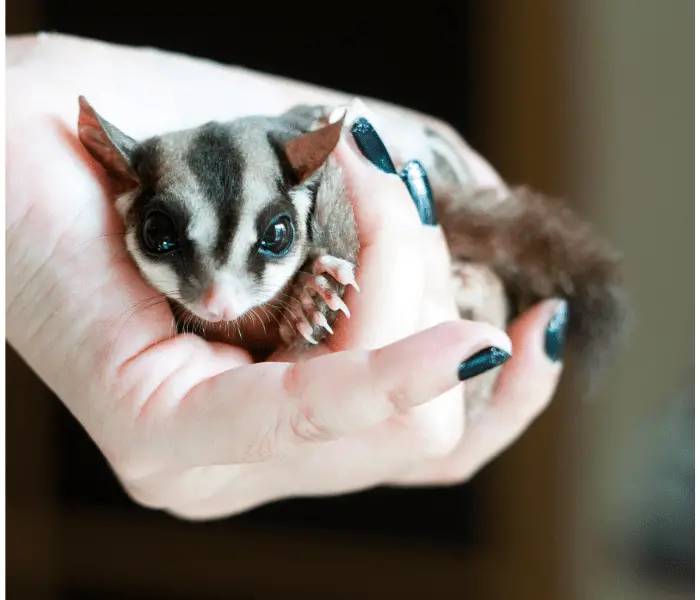Sugar gliders are very good at hiding symptoms of illness until it is nearly too late and they are already on death’s door. This article aims to help you identify the signs that your sugar glider is critically ill and the best to handle the situation.
A sugar glider that is busy dying will show symptoms of being critically ill such as severe lethargy, difficulty breathing, and inappetence (among other symptoms). You should get a dying sugar glider to a vet as soon as possible. If you cannot get a dying sugar glider to the vet, you can comfort them by placing them in a dark, quiet, warm place with minimal stimulation.

Signs That Your Sugar Glider Is Critically Ill And Might Die (12 Signs)
1. Refusing To Eat
Is your glider eating less than usual or refusing to take a treat they usually won’t say no to? If they are not eating well for a few days, it will result in lethargy and weight loss.
Pet Vet Tip: To read more on the different causes of inappetence in sugar gliders, have a look at this article.
2. Dehydration
Sugar gliders that are eating poorly often become dehydrated. You can check your glider’s hydration with the skin tent test by gently pinching and pulling on the skin on top of your glider’s shoulder blades. If the skin slides back into place within a second, they likely have normal hydration, but if the skin takes 2-3 seconds to return to normal or, worse, remains tented, your glider might be dehydrated.
It will be helpful to compare the skin tent test to other gliders in your colony and regularly check the skin tent to get a feel for what is normal for a particular sugar glider.
The skin tent test is not 100% accurate as many things can influence the skin tent. For example, overweight gliders will have a falsely decreased skin tent time. In contrast, geriatric sugar gliders will have a falsely increased skin tent despite normal hydration due to reduced skin elasticity due to aging.
Pet Vet Tip: Is it safe for sugar gliders to drink tap water? Find out here!
3. Lethargy Or Moving Slower Than Usual
This symptom is far too easy to ignore and is often easily missed. A sluggish sugar glider is almost always a major cause for concern.
4. Breathing Faster Than Usual Or Breathing With Difficulty
A change in breathing rate and effort can be a symptom of many different things, including pain, stress, or pneumonia. Any difficulty breathing (breathing with increased effort) is a significant warning sign that your sugar glider is critically ill.
5. Continuous Shivering
Sugar gliders often shiver (you can read more on the causes of shivering here), but if shivering continues for more than a few minutes, it could indicate that something major is wrong.
6. Unresponsiveness
When a sugar glider does not react to touch, they are critically ill. Sugar gliders are very good at hiding symptoms- if they reach the point of unresponsiveness, they are severely ill.
7. Uninterested In Playing And Socializing
If your sugar glider avoids leaving their pouch or avoids interaction with other gliders or a bonded human, they are likely very ill.
8. Vomiting Or Diarrhea
When a sugar glider vomits or has diarrhea, it should not be ignored. A glider’s tiny can dehydrate rapidly.
9. Change in Color Of The Nose
A healthy sugar glider has a bright pink nose. If the tip of their nose is blue or purple-tinged, bright red, yellow, or pale pink/white, it indicates major disease.
10. Excessive Barking From Cage Mates
If one sugar glider in a colony is suddenly acting strange, it may cause the other sugar gliders to make an alarm. If you suspect that one of your gliders might be ill and wake up to barking gliders, it is best to go check.
11. Being Awake During The Day
If you find that one of your sugar gliders is up during the day when the other sugar gliders are sleeping, it is more often than not an indication of illness.
12. Decline In Condition, Despite Appropriate Treatment
Even the best veterinary care does not always result in a happy ending. Sometimes our best efforts will still fall short. If your sugar glider is receiving veterinary care but does not seem to respond to the treatment, you need to talk to your vet.
When treating sugar gliders, a decline despite treatment is, unfortunately, often an indicator of a poor prognosis. Either adjusting the treatment plan or ending their suffering needs to be discussed with your treating vet.
What Must I do If My Sugar Glider Might Be Busy Dying?
If you think your sugar glider is dying and you can get them to a vet within a few hours, this should always be your first option, even if you are sure they are actively dying.
This is not only for the fact that your vet will be able to help make the process of dying less painful (you can read more about euthanasia in this article), but your vet will also be able to offer options to handle the body afterward and may offer some guidance and advice as to what might have lead to the situation.
Will The Vet Be Able To Save My Sugar Glider?
If you notice any symptoms in your sugar gliders, you need to get them to a vet ASAP! Sugar gliders can deteriorate rapidly. Make sure you have the contact details of a vet who is familiar with sugar gliders before you need it.
For your vet to be able to help your sugar glider best, they will NEED to run tests. It is often tough to accurately diagnose a small exotic pet such as a sugar glider without running tests because the symptoms they present with are often very non-specific.
This is why it is a great idea to have pet insurance or at least a small emergency fund so that you will be able to get your glider urgent medical attention when he/she needs it. The outcome of an emergency will be much more favorable if we can do everything medically necessary from the get-go. This means running tests to get an accurate diagnosis, which means that you sugar gliders get the correct treatment much sooner.
Of course, even the best veterinary care might still result in the loss of a beloved sugar glider. There are hundreds of factors that determine the prognosis of treatment, and it is impossible to account for and control each one of them. If you can, you will never regret at least trying to help your glider.
How Long Does It Take For A Sugar Glider To Die?
How long it takes a sugar glider to die depends on the cause of death. Typically a sugar glider will die within a few hours of showing symptoms of being critically ill if veterinary treatment has not ensued.
How To Comfort A Dying Sugar Glider
If you cannot get your sugar glider to a vet when they are showing concerning symptoms, the best you can do is keep them in a quiet, warm, and comfortable spot. Avoid any over-stimulation, such as excessive touching, loud noises, or bright light. Keep your sugar glider as quiet as possible.
Separate your ill sugar glider from the other sugar gliders, as gliders are often not very kind to sick members of the colony. If the sugar glider in question is bonded to you, you can place the pouch close to your body to help keep them warm.
What Should I Do After My Sugar Glider Has Passed?
Do not chastise yourself if you cannot get help or feel that you did not react soon enough. We cannot know exactly when death will come knocking on a beloved pet’s door. Give yourself a little grace.
I go a little deeper into what exactly to do if your sugar glider has passed in this article– go check it out!.
No matter the circumstances or cause of death, you did the best you can with the information you had and that is enough.
Be patient and kind to yourself. It might not feel that way right now, but the horrible feeling you are experiencing now, will pass with time
Resources
- Banks, R., 2013. Exotic small mammal care and husbandry. Hoboken: John Wiley, pp. 157 – 168. https://onlinelibrary.wiley.com/doi/book/10.1002/9781119265405
- Dierenfeld, E., 2009. Feeding Behavior and Nutrition of the Sugar Glider (Petaurus breviceps). Veterinary Clinics of North America: Exotic Animal Practice, 12(2), pp.209-215.
- Meredith, A. and Redrobe, S., 2002. BSAVA manual of exotic pets. 4th ed. Quedgeley: British Small Animal Veterinary Association, pp. 102 – 106 25. https://www.researchgate.net/publication/240493099_The_BSAVA_Manual_of_Exotic_Pets_4th_edn
- Saunders, R. (2015, April). What is a sugar glider, and how do I nurse it?. In BSAVA Congress Proceedings 2015 (pp. 372-373). BSAVA Library.
